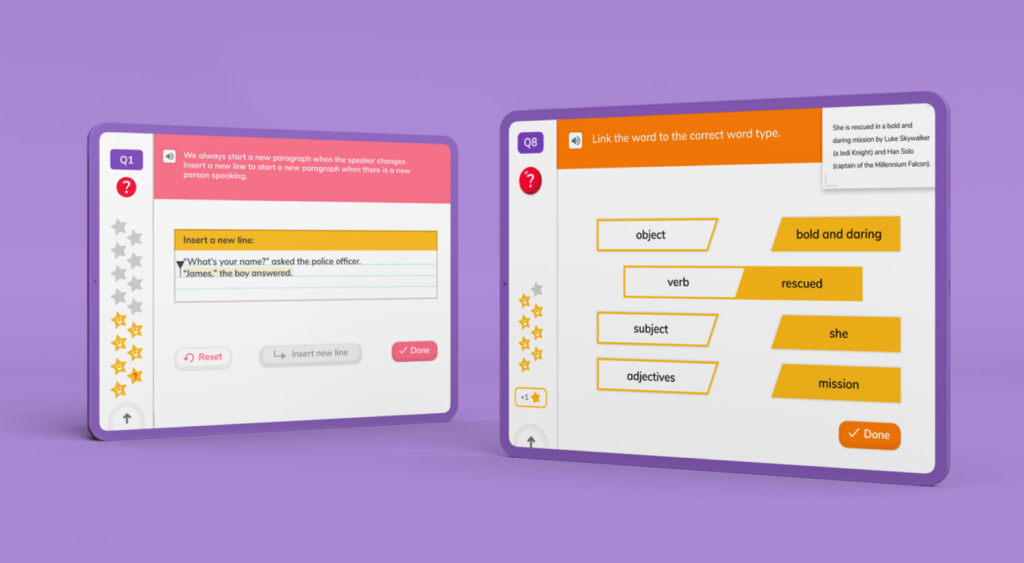

Learn what’s taught in the Key Stage 1 English Curriculum across the subjects of reading, comprehension, writing, composition & grammar.

Author
Mhairi Sim
Published
August 2024


Learn what’s taught in the Key Stage 1 English Curriculum across the subjects of reading, comprehension, writing, composition & grammar.

Author
Mhairi Sim
Published
August 2024


Learn what’s taught in the Key Stage 1 English Curriculum across the subjects of reading, comprehension, writing, composition & grammar.

Author
Mhairi Sim
Published
August 2024


Key takeaways
Table of contents
In Year 1 and Year 2, students cover aspects of reading, writing, and spoken language as they progress through the English KS1 national curriculum.
Reading and writing aspects are further broken down into sub-topics. For reading, students cover skills in word reading and comprehension. In the writing aspect of the curriculum, they’ll cover transcription (spelling and handwriting), composition, vocabulary, grammar, and punctuation.
Following the English KS1 national curriculum, Year 1 learners will focus heavily on their word reading skills. To develop these, they’ll work on gaining a strong understanding of phonics.
By the end of the year, they’ll be familiar with 40+ phonemes (sounds) and be able to read graphemes (letters). This should help them read both familiar and unfamiliar words.
Learners will develop their reading skills throughout the KS1 English curriculum by delving into a wide range of texts. This includes fiction, non-fiction, fairy tales, and poems, to name a few!
Whilst they read, students are encouraged to make links between the text and their own experiences. For example, can they think of any similarities between a character in a story and someone in their own life?
Reading from a broad range will also give kiddos a chance to discover and discuss unfamiliar words and learn their meanings. This is sure to give their vocabulary a boost too!
Unlock unlimited English questions
Put your skills to the test with fun exercises + learning games that are proven to boost ability!
A big focus of Year 1 is spelling. Directly linked to the study of phonics, students will learn to spell familiar phonemes, common exception words, and days of the week. They will also learn how to use simple prefixes and suffixes.
Pupils will also begin to apply simple spelling rules and should be able to recite the alphabet.
In terms of handwriting, learners should be able to form capital letters and begin to form lowercase letters properly. By the end of the year, they’ll have mastered digits 0-9 and be able to hold a pencil comfortably and correctly too!
Throughout the national KS1 English programme teachers have learners start to think more about what they’re writing. This includes putting a sentence together verbally before writing it down and reading their work back to make sure it makes sense.
In Year 1, pupils learn how to punctuate their sentences properly. This includes leaving spaces between words, using capital letters and full stops, and other forms of punctuation like question marks and exclamation marks. They should also start joining clauses with the word ‘and’.
For a more in-depth look at the Year 1 curriculum take a look at our Year 1 English curriculum page!
DoodleEnglish is an app that’s filled with thousands of fun, interactive exercises covering grammar, punctuation, spelling and more!
Designed by teachers, it creates each child a unique work programme tailored to their needs, boosting their confidence and skills in English. Try it for free today!

In Year 2 learners continue to solidify their phonics knowledge as they learn to read more two-syllable and common exception words. This year they’ll also spend time reading books aloud, showing that they can comfortably sound out words.
In this final year of the English KS1 national curriculum programme, kiddos will build a toolbox of reading skills including, inferring, questioning and predicting as they read.
They’ll be given ample opportunities to discuss their views on what they’ve read, look at the structure of different types of books and stories, and recite poems.
This year kids will continue to build their spelling skills from their phoneme knowledge as well as learn to spell more common exception words, homophones, and contracted words.
Their handwriting should be clear and legible by the end of Year 2 and they should be able to form all upper and lower case letters.
In the back-half of the KS1 English curriculum, students will explore writing for different purposes. This includes story writing, poems, instructions, and non-fiction.
Kiddos will be taught how to plan their writing ahead of time, taking time to think about what they’re going to put down on the page.
After writing, they’ll be encouraged to read over their work to make sure it makes sense and has proper punctuation.
In Year 2, students continue to develop their understanding of vocabulary, grammar, and punctuation by learning about different types of sentences, noun phrases, verb tenses and more grammatical devices.
Before Year 3, they should be able to appropriately use punctuation throughout their work including full stops, capital letters, question marks, exclamation marks, commas, and apostrophes.
For a closer look at the Year 2 English curriculum take a look at our Year 2 English curriculum page!
The goals of the spoken language curriculum remain the same across all years of primary school education. This means, that it’s up to individual teachers to decide how best to achieve these goals in an age-appropriate way for their students.
KS1 students will be encouraged to develop their use of spoken language (or talking and listening as it’s sometimes known) in a variety of ways including:
There are a few KS1 assessments to be aware of if you have a learner working their way through this stage. While schools may schedule their own informal assessments, there is only one official exam required at the national level.
The Phonics Screening Check is an assessment that aims to test learners’ understanding of their phonics. They’ll be asked to read aloud 40 different words and pseudowords (not real words) to an adult who will mark their answers as they go.
The assessment is usually taken at the end of Year 1 in June and gives schools a good measure of their learners’ awareness and understanding of grapheme-phoneme correspondences (GPCs).
This is a statutory assessment for KS1 English students, meaning that all Year 1 learners are required to take part.
Up until recently, Standard Assessment Tests (or SATs) were statutory assessments that students would sit at the end of Year 2. However, these are no longer mandatory, meaning that they are optional assessments.
Many schools still opt to have their students sit these papers and use results as an assessment tool for Year 3 teachers. However, since Year 2 SATs are not statutory assessments, you can ask that your child not sit for them, if you wish.
Check out our KS1 SATs guide to learn more about these exams!
A clear aim of the national curriculum English curriculum is phonics. To that end, any reading practice you can give your little one is a great way to help them!
From reading books and novels to shopping lists and menus – there are a ton of ways you can incorporate a little bit of reading into each day!
While you’re reading stories together, try asking questions like:
Our DoodleLearning English app is a fantastic option if you have a learner who loves spending time playing games on their devices! The app has thousands of interactive games and activities that are all linked to the national curriculum.
What’s even better is that each kiddo will get a personalised programme of activities that are catered to their needs and the skills they’ll benefit from practising! What’s not to love?
The KS1 English curriculum marks an important first step in our learners’ school journeys. In these years they’ll be developing the foundational skills they’ll use for the rest of their schooling and beyond!
For a more detailed look at the English curriculum in each of the KS1 years, be sure to take a look at our Year 1 and Year 2 English curriculum pages! Here you’ll learn exactly what your kiddos will cover in these years, and even more ways to help them out each year!
Book a chat with our team
If you’d like to use Doodle’s browser version, please visit this page on a desktop.
To log in to Doodle on this device, you can do so through our apps. You can find out how to download them here: